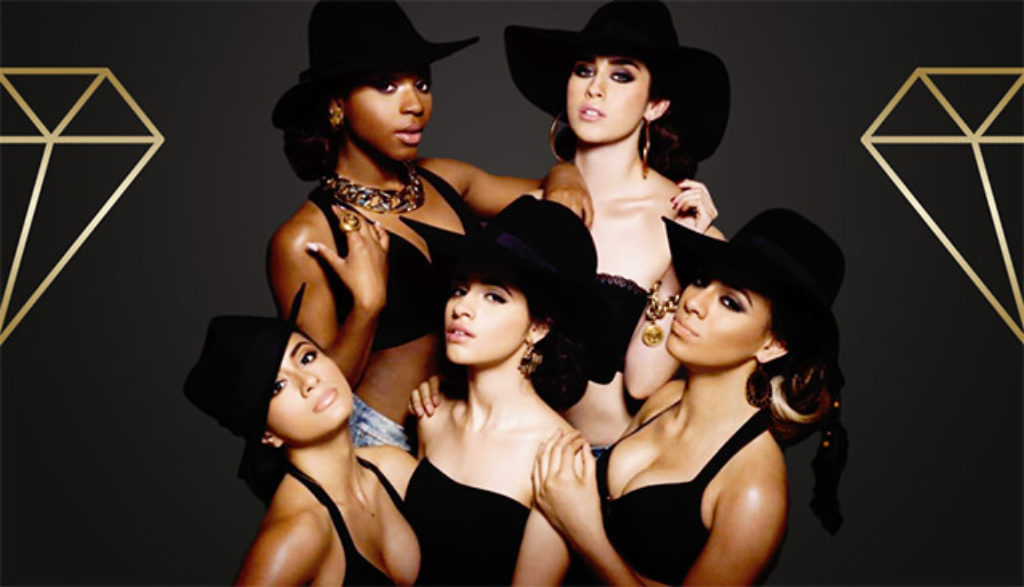
Simon Cowell no longer enjoys the kind of cultural power he wielded at the height of American Idol‘s popularity. But make no mistake: The sarcastic, black T-shirt wearing British music mogul is still influencing global pop culture in ways that extend far beyond his judging roles on the British and American versions of his Idol-like show X Factor. Cowell helped envision and launch the boy band One Direction, one of the biggest new acts to emerge from any of those reality singing competitions in recent years. And now he hopes to replicate that chart-dominating success with the girl group Fifth Harmony.
As was the case with One Direction, each of the five members of Fifth Harmony (Ally Brooke Hernandez, Normani Kordei, Dinah Jane Hansen, Camila Cabello and Lauren Jauregui) auditioned as soloists for X Factor but didn’t make it very far in the competition on their own. Enter Cowell, who shepherded the five singers into a group initially known by the acronym LYLAS (Love You Like a Sister), then 1432 (text shorthand for “I love you too”). The ladies eventually placed third on the second season of the American version of the show, and Cowell gave their online fans a chance to choose the group’s current moniker: Fifth Harmony.
The glamor-minded girls have since been traveling with Demi Lovato and Austin Mahone, polishing their sassy, sensual synthesis of pop, R&B and hip-hop.
“Them Girls Be Like” is a girl-power anthem that critiques stereotypical female insecurities. It begins, “Do my [fill-in-the-blank silence] look fat (or not)?/Should I call him back (or not)?/Wear my hair like that (or not)?” The song celebrates women strong and authentic enough to be who they really are without succumbing to self-doubt stemming from what others think, largely in the social media realm. The girls sing, “Do you ever post your pics with no filter?/#I woke up like this too/ … That’s what we be like, yeah/Lovin’ this life ’cause we really don’t care.” “BO$$,” meanwhile, name-checks Michelle Obama as a positive role model worth imitating (“Use common sense, I’m on my Michelle Obama”). The song also brims with self-respect (“C-O-N-F-I-D-E-N-T/That’s me, I’m confident”) and praises hard work (“Working for the money/’Cause that’s what my momma taught me”).
“Suga Mama” tells a would-be boyfriend he needs to get a job (“Is you gon’ get a job/And make some of that green?/You tryna take me out/But you can’t pay for me”), then repeatedly affirms, “I can’t be your suga mama.” In a similar vein, “We Know” finds a woman confidently telling a wealthy, manipulative ex, “I know I’m better off without ya/ … I won’t believe a thing you say this time.”
“Everlasting Love” involves a patient, self-respecting woman waiting expectantly for an “exceptional, original” guy. And lines could even be heard as advocating saving sex (or at the very least emotional intimacy) for the right person (“I know it sounds crazy/But I hope you save all you got for me”).
That desire for respect on “BO$$” gets diluted by profanity (“So yo a– better show me some respect”) and tired, go-to rap symbols for material excess (“I’m a Maybach and you’s a Volvo”). Healthy self-confidence morphs into narcissism on “Reflection,” where we hear, “Ooh, where you from?/Must be heaven/You’d be rich if looking good was your profession/Think I’m in love, ’cause you so sexy/Boy, I ain’t talkin’ about you, I’m talking to my own reflection.”
Then “Worth It” demands, “Give it to me, I’m worth it.” And as to what the “it” in question is, we learn that it’s rough sex: “I’ll tell you what to do/Come harder just because/I don’t like it, like it too soft/I like it a little rough/Not too much, maybe just enough.” Guest Kid Ink asks, “In the club with the lights off//What you actin’ shy for?” “Sledgehammer” moves from being anatomically suggestive (“I feel the fever and I won’t lie/I break a sweat/My body’s telling/All the secrets I ain’t told you yet/ … You’re turning me on/And my fire’s waitin’ for your spark”) to plainly expressing a woman’s sexual appetite (“I’ve had enough/Undress my love/I’m coming over”). Similarly, “Like Maria” defines romance almost exclusively in carnal terms (“Your loving takes me higher/You set my heart on fire/When you touch my body/Got me singing like Mariah”). Guest Tyga objectifies a woman, singing, “Sit on my lap, angel body/I’m a king and need a goddess, gotta love it.”
Several lines on “Top Down” are easy to hear as sexual double entendres revolving around engines, trucks, convertibles and “ridin’.” The Black Eyed Peas-esque “This Is How We Roll” idealizes life as a sexy, crazy, nonstop party. And “Top Down” chimes in with, “Passed out real/And I woke up realer.” “Them Girls Be Like” includes a repeated, partially censored s-word. “D–n” shows up on “Suga Mama” and “We Know.”
With a title like Reflection, the obvious question about Fifth Harmony’s debut is this: What cultural values are these five young women actually mirroring? Ally, Normani, Dinah, Camila, and Lauren are clearly trying to lay claim to messages about self-respect and being unapologetically strong. But too often healthy self-respect slides into unhealthy self-objectification. And the truly lasting image we see here—from the way these girls present themselves to the things they sing about—is one of casual sex serving as the primary route to meaning and purpose in relationships and in life.


After serving as an associate editor at NavPress’ Discipleship Journal and consulting editor for Current Thoughts and Trends, Adam now oversees the editing and publishing of Plugged In’s reviews as the site’s director. He and his wife, Jennifer, have three children. In their free time, the Holzes enjoy playing games, a variety of musical instruments, swimming and … watching movies.